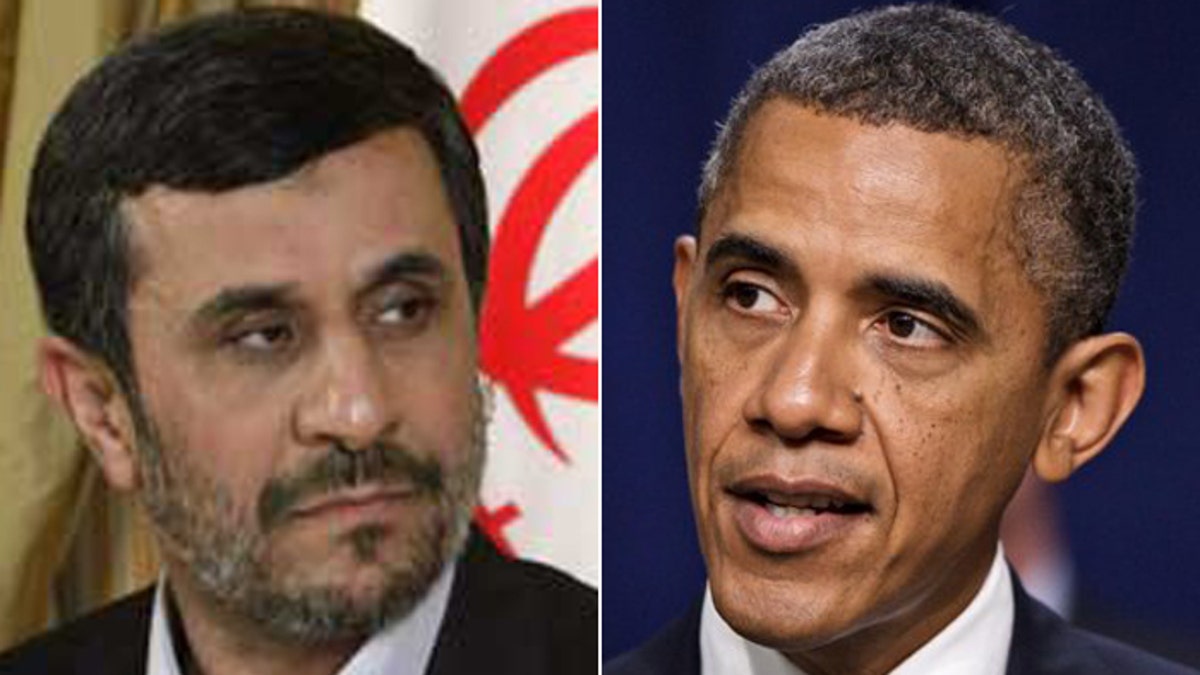
Iran's rogue regime tells Obama administration not to expect
The Iranian regime isn't cheering President Obama’s victory, warning instead that the U.S. should not expect any renewed negotiations with Tehran anytime soon.
The standoffish and critical reaction may surprise some, given that GOP nominee Mitt Romney, as well as Israeli leaders, have been critical of what they see as Obama's soft stance on Iran's efforts to get nuclear weapons. But the Obama administration has spearheaded crippling sanctions against Iran and Obama has stated several times that all options -- including military -- are on the table in dealing with the Iranian threat.
"After all this pressure and crimes against the people of Iran, relations with America cannot be possible overnight and Americans should not think they can hold our nation to ransom by coming to the negotiating table," Judiciary Chief Sadeq Larijani was quoted as saying by IRNA news agency Wednesday.
Prior to the election, a review of online writers and bloggers in Iran hinted that the Iranian regime preferred a second term with President Obama over Romney, who they believe to be more hard line. They also found Romney’s close relationship with Israel and contempt of China and Russia’s roles in the Middle East problematic.
Now, the Iranian regime is expressing indifference, attempting to say that their geopolitical stance will neither waver nor depend on the U.S. candidate in office.
"The Americans should not imagine that they can blackmail our nation by sitting at the negotiating table with Iran," Larijani added.
There had been rumors that if President Obama would be reelected, the U.S., which has not had diplomatic relations with Iran for more than 30 years, may initiate direct talks.
Though foreign policy was not a cornerstone issue of the presidential election, the ongoing threat of a nuclear Iranian regime will be one of President Obama’s largest obstacles in 2013.
The P5+1 nations, comprising the permanent members of the U.N. Security Council -- the U.S., Britain, China, France and Russia, plus Germany -- have convened multiple times in a series of unsuccessful attempts to curb Iran’s nuclear program.
The Tehran government has repeatedly denied developing nuclear weapons, insisting its program is entirely for peaceful purposes. Others have disputed that claim, and said evidence clearly indicates it is working toward nuclear weapons capability.
"Four years ago, Obama announced he would extend the hand of cooperation to Iran," Larijani said. "But he pursued a different path and imposed unprecedented sanctions and it is natural the Iranian people will never forget such crimes."
Despite the regime’s public statements, one blogger writes, “There is considerable rejoicing in Tehran today, particularly for those tied to the government. The threat of war has passed us, many believe,” suggesting that President Obama, unlike Romney, will not initiate military action against Iran.
There is a high level of speculation, particularly among Iranians in Iran, that secret negotiations already took place between them and the U.S. Many media reports in October referred to clandestine talks between the two countries. Iranian media and independent bloggers echoed the reports.
Officials on both sides vigorously denied the reports.
There is increasing pressure on Obama as he completes his first term and begins his second on how to deal with the ever-emboldened Iranian regime, particularly as the nuclear alarm clock continues to tick, bringing them tragically close to weapons capability.
The timeline for military action against the Iranian regime as outlined by Israeli Prime Minister Benjamin Netanyahu alluded to a spring deadline.
In his speech to the UN General Assembly in September, Netanyahu said his illustrated depiction of the Iranian regime nuclear agenda represented the 90 percent mark to making a nuclear weapon, achieved through production of 20 percent-enriched uranium, which Israeli intelligence calculates will be reached by spring.
According to the latest IAEA report, Iran had produced about 19.75 percent uranium as of August.
Israeli Defense Minister Ehud Barak said in a broadcast interview last week that Israel would not oppose talks between the U.S. and Iran within strict bounds.
"If the U.S. decides to talk with Iran over a limited and relatively short period only in order to ascertain if it is possible to get it to stop its nuclear program, we will have nothing to say about this," Barak said.
"But if there is an attempt (by Iran) to drag (the talks) out over many months or a year, then it could be detrimental and it could lead to a form of tension," he added.








































